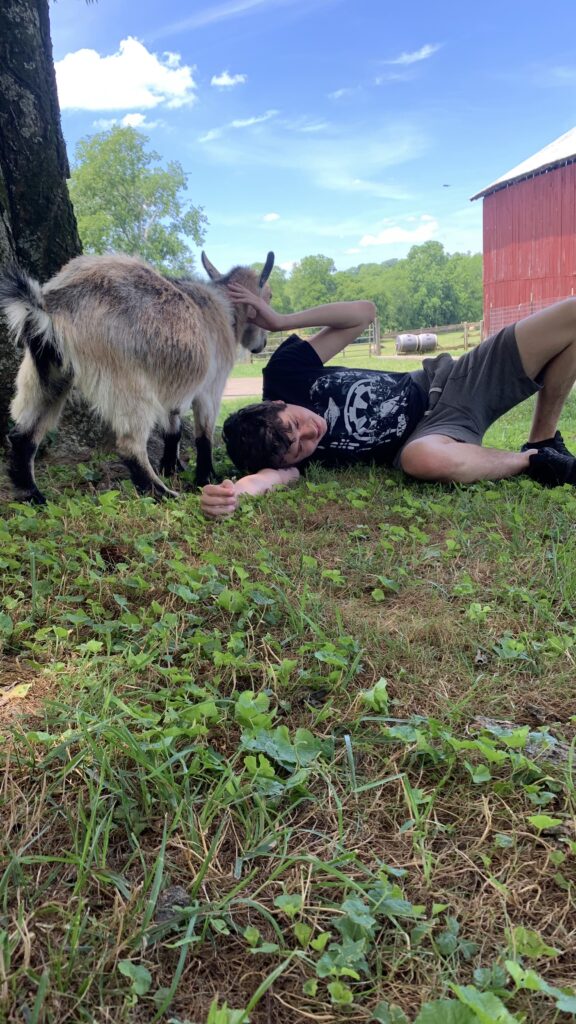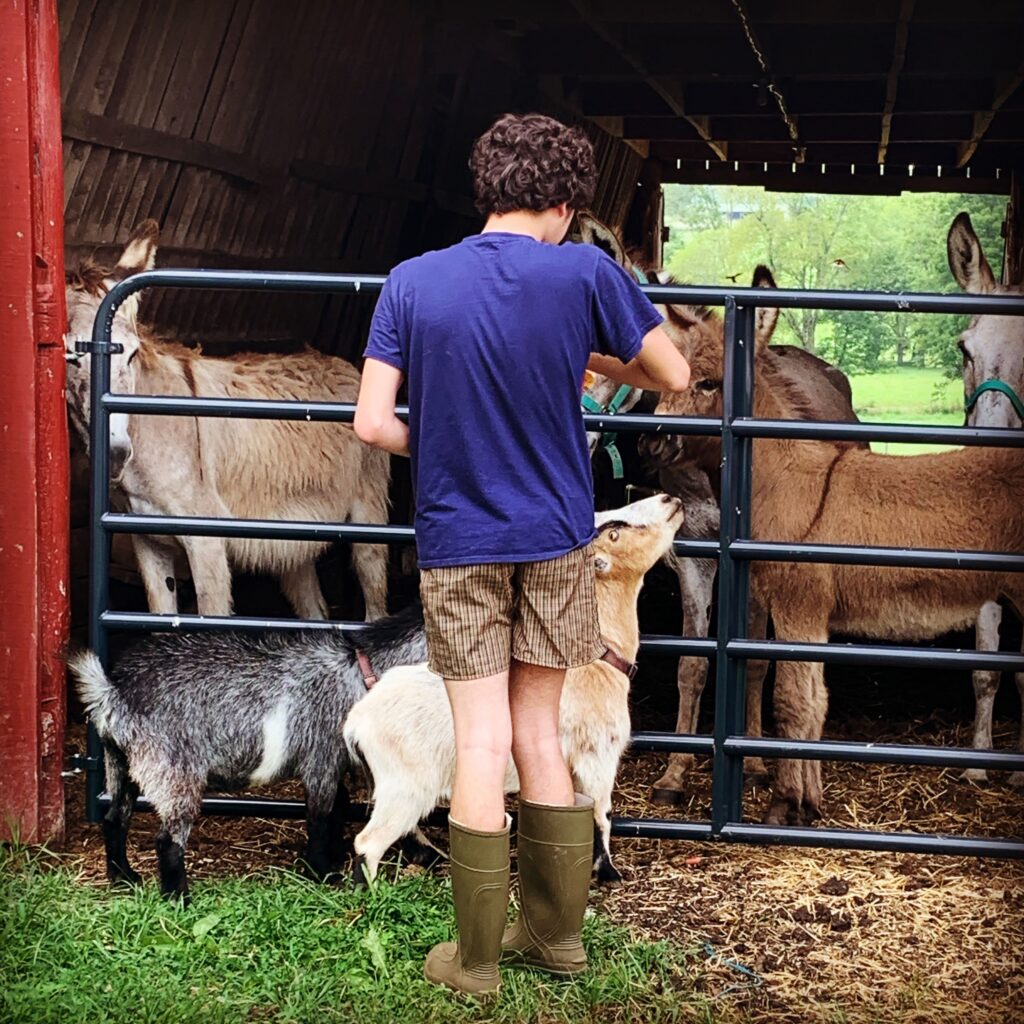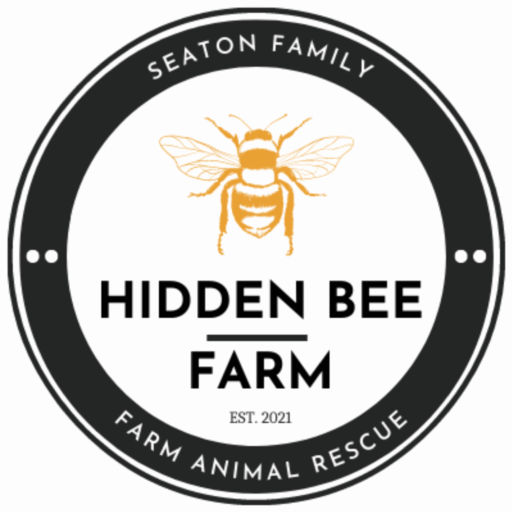
How working with farm animals helped our son develop emotionally and socially
We are often asked what started us down the journey of farm animal rescue.
Research and our son’s lead: The driving force behind our journey in farm animal rescue.
“I think using animals to teach kids empathy is great. Kids learn to love and care for animals, and then they apply that to people.” Dr. Temple Grandin
As parents, we were devastated when Jackson was first diagnosed with autism. Like most parents, we were faced with a lot of uncertainty and fear about what the future would hold for our child. We tried many different therapies, some of which worked and some of which did not. It was a difficult and trying time for our family, but we were determined to find something that would help our son.
One thing that stuck out to us during our journey was Jackson’s connection with animals. He was always drawn to them and seemed to find comfort in their presence. We began to explore the idea of animal therapy and soon discovered the therapeutic benefits of farm animals for children with autism.
As parents of a child with autism, we understand the challenges that come with raising a child with special needs. One of the things that has helped our son, Jackson, the most is his love and connection with animals. Through research and our own personal experience, we have come to appreciate the therapeutic benefits that farm animals can provide for children with autism.
Farm animals, such as horses, goats, cows, pigs, sheep, chickens, and more, can offer a wide range of therapeutic benefits to children and adolescents with autism. Studies have shown that interacting with these animals can improve socialization, reduce OCD symptoms, increase speech and language skills, and provide sensory stimulation.
Horses, for example, can be used for equine therapy, which can be effective for children with autism. Equine therapy is a type of therapy that utilizes the movement of the horse to improve balance, coordination, and self-awareness in children with autism. The movement of the horse mimics the movement of a human pelvis, which can help children with autism improve their sensory processing. This can also help children with autism to improve their ability to focus and pay attention, and to develop a sense of trust and security.
Goats, on the other hand, are known for their friendly and curious personalities, which can help children with autism improve their social skills. They are also known to be very calming animals and can help children with anxiety and stress. They are also known to be very interactive animals and this can help children with autism to improve their communication skills.
Cows are large and gentle animals that can provide a sense of security for children with autism. They are known to be very patient animals, which can make them great companions for children with autism. They are also known to be very responsive animals, which can help children with autism to improve their ability to read body language and facial expressions.
Pigs are known for their intelligence and can be trained to do simple tasks, which can help children with autism improve their cognitive skills. They are also known to be very affectionate animals, which can help children with autism improve their social skills. They are also known to be very interactive animals, which can help children with autism to improve their communication skills.
Sheep are known for their calm and docile nature which can be very calming for children with autism. They are also known to be very responsive animals which can help children with autism to improve their ability to read body language and facial expressions.
Chickens are known for their calming presence, and their gentle nature can be very soothing for children with autism. They are also known to be very responsive animals which can help children with autism to improve their ability to read body language and facial expressions.
It is important to note that every child is different, and what works for one child may not work for another. However, many experts in the field of autism and animal therapy recommend considering farm animals as a form of therapy for children with autism.
When considering farm animal therapy for your child with autism, it is important to work with experts in the field. This could include animal therapists, occupational therapists, speech therapists, and others who are trained to work with children with autism and animals. They can help you find the right animal and therapy for your child, as well as provide guidance on how to safely interact with the animals.
Dr. Temple Grandin, a renowned animal behaviorist and advocate for individuals with autism, states, “Animals are not afraid of being different, and children on the autism spectrum can learn a lot from them.” She emphasizes the benefits of using farm animals as a form of therapy for children with autism.
From equine therapy with horses to socialization with goats, cows, pigs, sheep, and chickens, there are many different options available to explore.
It’s also important to remember that the benefits of animal therapy go beyond just physical and cognitive improvements. The emotional and psychological benefits can be just as important, if not more so. Animals can provide a sense of comfort, security, and unconditional love that can be incredibly beneficial for children with autism.
We encourage parents to consider the therapeutic benefits of farm animals as a form of therapy for their children and to work with experts in the field to find the right animal and therapy for their child. It’s important to keep an open mind and be willing to try different animals and therapy methods to find what works best for your child. It’s also important to remember that this is a journey and progress may be slow, but with patience, perseverance and the right approach, the benefits can be truly life-changing.
Multiple studies have shown the human-animal bond can benefit many on the autism spectrum. According to Autism Speaks studies support the idea that interacting with pets benefits many children on the autism spectrum.
Whether it is a trained service dog, guinea pig, or goat, there is scientific evidence supporting the positive influence of human-animal interaction.
So should you venture down the animals and special needs journey? Our best outcomes happened when we stepped back and followed Jackson’s lead.

